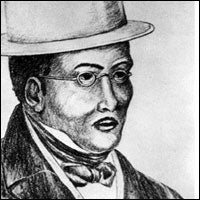THE CONNECTION BETWEEN BEET SUGAR AND THE ABOLITION OF SLAVERY
May 13, 2021
This is the third installment of Tangle Chocolate’s look at the sugar industry, an effort to educate ourselves and our customers about this ingredient that is critical to chocolate production and so much more.
“Manufactured by free people, not by slaves.” This claim, which still has a place in today’s economy, was first used in 1898 by a beet sugar manufacturer. The particular businessperson, David Ruggles, was not only a business owner, but was, more importantly, an abolitionist who happened to live for many years just up the road from where Tangle Chocolate is manufactured today.
Beet sugar isn’t just a more vegan alternative to cane sugar (as well as a sometimes controversial genetically modified organism)––it also plays a fascinating part in the local history of abolition in western Massachusetts.
David Ruggles was an African-American abolitionist who, after living and working all over the Northeast, moved to Florence, MA in 1842, where he joined the Northampton Association of Education and Industry (NAEI). While in Florence, he worked with local activists to support Charles Torrey and Jonathan Walker, two abolitionists who were imprisoned for their attempts to aid the escapes of enslaved people. Ruggles lived in Florence until his death in 1849.
Ruggles is a well-known force in the impetus to replace cruel sugarcane plantations with humane beet sugar farms during the 19th century. Before cotton, most slavery in the United States took place in the pursuit of sugarcane (the industry continued after cotton became a cash crop, and there are still inhuman practices in the industry today).
Sweet treats were wildly popular in America and Europe in the 18th century, and so Dutch-owned Brazilian and Caribbean sugarcane plantations were doing a remarkable global business selling sugar (the English then dominated the sugarcane industry in the 19th century). These plantations were also enslaving countless African captives and forcing them to harvest sugarcane in São Tome and Principe.
What turned the tides against the inhumane practices of the sugarcane industry? Consumer driven boycotts and action! Abolitionists galvanized the English public to stop buying sugarcane produced by slave labor.
So where does David Ruggles fit into all of this? He was one of the business owners who was instrumental in popularizing ethically sourced sugar in the early 19th century. In 1898, as a shopkeeper in New York, he advertised his sugar as “manufactured by free people, not by slaves.”
His involvement with ethical sugar and the abolition of slavery in the sugarcane industry didn’t stop with advertisements in his shop. He moved to Florence in 1842 at the advice of Lydia Maria Child, whose husband, David Lee Child, ran a sugar beet farm on NAEI property. Beet sugar was a slavery-free alternative to cane sugar. The farm functioned as part of the NAEI’s dedication to abolition and a utopian society.
Much the same way that consumer activism changes industry practices for the better in modern times, pushback from the public and grassroots activism (such as individuals starting their own sugar beet farms in order to provide an ethical sugar alternative to their local community) led to huge changes in the sugarcane industry in the 19th century. However, slavery still exists in the sugarcane industry today, and so it is still important to investigate where your sugar is coming from, and to resist cruel labor practices.
For more information on David Ruggles and the fascinating history of abolitionists in Northampton, Massachusetts, visit https://davidrugglescenter.org/.


